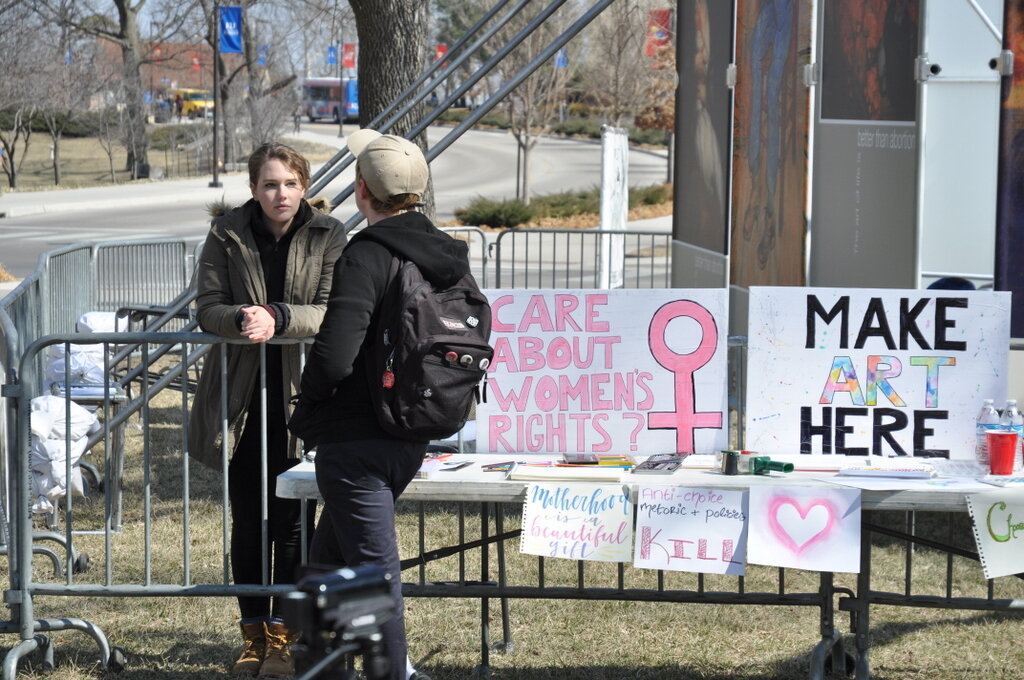Impact Report, January 2025
By Andrea Thenhaus
Over the past few months I’ve reminded you that just getting people to “stop and think” is a big part of what’s needed in order to initiate cultural change. (See this Oct. 2024 post and this Nov. 2024 post.) The moments people spend with our trainers and volunteers during campus outreach can be transformative. In this Impact Report, JFA trainer Andrea Thenhaus gives an example from a recent outreach event in California. (This post updates the original post from Nov. 20, 2024) Many of you responded to our appeals for year-end funding during the past two months. Thank you! It’s a privilege to partner with you to train followers of Christ to change hearts and minds on abortion. - Steve Wagner, Executive Director
Our team had the opportunity to engage with students on the issue of abortion at California State University San Marcos (CSUSM) and MiraCosta College in California in October 2024. At CSUSM, we were getting ready to take down for the day when two international students walked up to our poll table, and I engaged them in conversation. I will refer to the student who did most of the talking as “Joseph”.
Andrea: Do you think abortion should be legal for all nine months of pregnancy or only for a certain window of time?
Joseph: Oh, I don’t think it should be legal for all nine months.
Andrea: Ok. I have our brochure here with images of the unborn at different stages of development (shown right). Where would you draw the line?
Joseph: I think abortion should be legal until the first trimester.
Andrea (center in hat) interacts with a student at the JFA outreach event at CSUSM in October 2024.
Above, Jon, Alora, and Andrea interact with students at JFA’s MiraCosta Outreach in October.
After talking through the legality and the circumstances under which these students thought abortion should be legal, I asked them when they thought life begins biologically speaking.
Joseph: I am not sure. I am not a physician so it’s hard to say.
Andrea: No problem. Obviously I’m not a doctor either, but do you mind if I share with you my understanding of the basic biology?
Joseph: Yes, totally.
Andrea shared pages 4-5 of our brochure with Joseph. Get your own copy at jfaweb.org/brochure.
Andrea: If the unborn is growing, would you agree it is alive?
Joseph: Yes, I would agree with that.
Andrea: If the unborn has human parents, would you agree it is human?
Joseph: Yes.
Andrea: Right. Living things reproduce after their own kind. Dogs produce dogs and cats produce cats, so it would make sense to say that humans produce human offspring. At conception, the unborn has a complete set of DNA. It just needs time to grow and develop. Are you familiar with Polaroid cameras?
Joseph: Yes.
Andrea: The development of the unborn is similar to a polaroid photo. After I take a picture, it takes time for the film to develop. However, as soon as I take a picture, that image has been captured. I just need to wait for it to develop in order to see it. From conception the unborn is a whole, living human organism. The unborn just needs time to grow and develop [for you to be able to see it]. Does that make sense? What are your thoughts on that?
Joseph: Wow. Honestly that makes so much sense, and this is making me change my mind on abortion.
Our conversation continued, and we talked about the realities of abortion. The students agreed that the process of abortion is horrible.
Outreach at Wayne State College, September 2024
Before Joseph and his friend left, I thanked them for taking the time to have a conversation. They thanked me and expressed again how our conversation had changed their minds. They now understand that the unborn is a living human being and that abortion is taking a life.
It was amazing to see God at work in these students’ lives. Students often do not think the unborn is a human being. Once they understand what science teaches about the beginning of human life, some students are more likely to realize the tragedy of abortion. I am thankful that Joseph and his friend were willing to have a conversation and that they were open to the truth.
“The development of the unborn is similar to a Polaroid photo...As soon as I take a picture, that image has been captured…
From conception the unborn is a whole, living human organism. The unborn just needs time to grow and develop [for you to be able to see it].”









